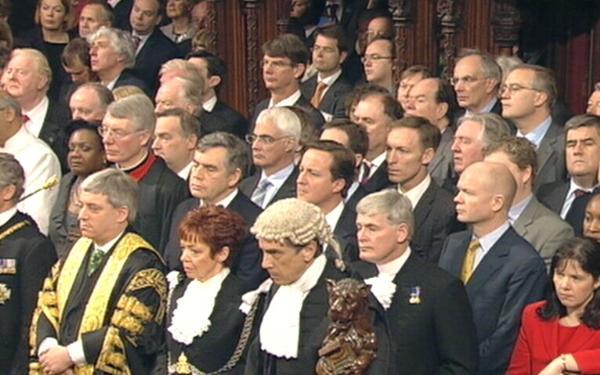As the Queen opens the new Parliament , Joe Egerton urges us to reflect on what Edith Stein, twentieth century philosopher, martyr and canonised saint, had to say about the morality of government, and recognise that the Members of the House of Commons are elected to be above all the guardians of virtue in public life.
The Coalition is a momentous political change. As Anthony Carroll observed in Thinking Faith, our politics are adjusting to the end of tribal Britain[1]. He is only one of a number of thoughtful commentators to recognise a seismic – and beneficial – shift in our politics[2]. Comparisons are inevitably being drawn with earlier coalitions, including that of 1918 -1922[3]. We need to re-think the relationship between electorate, parties and the state, and to ask what we mean by morality in politics. It is this question that was addressed in 1921 by the philosopher Edith Stein[4].
Stein on morality and the state
The political background to Stein’s work was the collapse of Imperial Germany and the emergence of the democratic Weimar Republic, which involved a shift in the relationship between the individual and the state. The intellectual background was Edith Stein’s own work on the conception of the individual and the community. We will need to return to some of her questions, but at this stage I focus on the position she took on the relationship between the state and ethical norms and values. ‘The state is not an abstract entity. It acts and suffers only as those individual agents through whose actions the functions of the state are discharged act and suffer. And it is their actions that conform to or violate norms and values.... the state is just or unjust, protective to those whom it ought to protect, and scrupulous or unscrupulous in its dealings with other states, only insofar as the relevant individual persons have these characteristics. Moral predicates apply to the state only insofar as they apply to the relevant individuals.’[5]
As MacIntyre observes, this places her at odds with most political theory. But it also places her foursquare with the mood of the British people, demonstrated during and before the election, most vividly exemplified in the fury over MPs’ expenses but also in the widespread feeling that something was badly wrong over the Iraq war. We do think as Edith Stein did – our politicians are to be blamed and praised for the morality of their actions.
The free recognition of the state by its citizens
What, according to Edith Stein, distinguishes the state from other associations is sovereignty. The state must be freely recognised as sovereign by its citizens. There is nothing original in this.[6] But Edith Stein’s next proposition – that sovereignty is not self-sustaining – is challenging:
What is required to sustain the sovereignty of a state is continuing recognition of that sovereignty by its citizens, a recognition derived from shared underlying agreement expressed in shared communal goals or in movement towards such goals....Where there is too little in common between on the one hand the goals pursued and the values upheld by the state and on the other the goals and values that inform the communal lives of its citizens, the state will rest not on agreement, but on the use of coercive force.[7]
In our constitutions, ‘party’ and ‘government’ have become blurred. Party names have become attached to ‘government’. The Coalition has emerged from the electorate’s withdrawal of recognition from one political party without a matching conferment of recognition on another party. The two parties that make up the Coalition do enjoy together the support of some sixty percent of the electorate, and the Coalition is entitled to use the sovereign powers of the state. But it must do so as a recognised sovereign government, governing by the consent of the people, not by monopoly of the coercive power of the state. So we can look more closely at Edith Stein’s analysis of what this might involve, recognising as Edith Stein did that in general the values and norms that are to find expression in the life of the state are secular norms and values[8].
Individuals, community and the state
Edith Stein’s work on the relationship of the individual to the community helps to illuminate this. In 1921, she developed an analysis that we, with hindsight, can see had the resources to analyse one of the then-imminent developments in German history. Edith Stein distinguished between two types of politician, the demagogue and the Volksmann. This matched a distinction between two ideal types of social organisation: the associations (which one joins to further one’s own aims and in which one uses other people who belong to the association to support that pursuit); and the community (which has an external goal which one joins because it is a means of realising one’s true identity.) The demagogue seeks to use the body of citizens to further his ends; the Volksmann to articulate the (virtuous) values of the communities that make up the state[9]. Edith Stein was undoubtedly right in perceiving the extent to which the German people had become a mass, open to being swayed by a demagogue as yet waiting in the wings, rather than a community or communities with values. We should perhaps ask ourselves ‘to what extent have we become a mass?’
Even if we conclude that we are not in danger of becoming a mass, we still need to consider the issue of communal values. One reason for the widespread detestation of politics is a perception that political parties have become simply instruments for obtaining power, not a means to enable values to be carried into the choice-making mechanisms of the state. If the choices made on our behalf by the state are antipathetic to our values then there will be a progressive withdrawal of recognition of the sovereignty of the state. We can see symptoms of this withdrawal, this disengagement, in an increasing reliance on coercion, a coercion that itself encourages a further withdrawal of recognition. At a societal level we are in danger of that descent St Ignatius warns can overtake an individual in desolation. If the party system is not capable of importing values into government, how do we break this spiral?
An agenda for Commons reform
In an English context (with devolution the main focus needs to be on England) the starting point must be the reform of the House of Commons[10]. Whatever is to be done for future elections, the immediate need is to ensure that the newly elected House operates as a body that is genuinely representative of the communities that make up the nation. One explanation for the contempt in which the last House came to be held is that it failed in this, its historic role. However, the last House did take some steps to give the new House a fair start.
First, the expenses system has been cleaned up and will be administered by a new and, one hopes, firm minded and rigorous body. Second, the Party Whips will no longer control the membership and chairing of the Select Committees. Third, since becoming Speaker, John Bercow has implemented valuable reforms that have enabled MPs to require Ministers to explain themselves. Far more questions are now answered by Ministers orally: Ministers have more often come to make oral statements, on which they can be asked supplementary questions, and have more often been forced to appear and answer questions on important topical matters; and select committee reports are being debated more often. All of this is good news.
Unfortunately, in the last Parliament, opposition organised by somebody in the whips office[11] frustrated the most important recommendations of the Wright Report, on legislation. The idea that the House, rather than the government, should determine allocation of business was first raised by Robert Parsons in the 1590s and repeated in the Wright report. Four hundred years after Parsons’ death, the Coalition has promised to implement the proposal in stages, so by 2013 the House rather than the government will decide how much time it wishes to give to each piece of legislation. This is an important reform, one that may substantially increase the ability of the House as a whole to maintain that link essential to Edith Stein’s desideratum of continuing, refreshed popular recognition of the sovereign authority.
Strengthening the House of Commons is also essential to aligning the morality of the state with the morality of the individual. Edith Stein’s conclusion – that there is a single set of values that applies to both state and individuals – is, if one thinks about it, an astonishing one. Our immediate response is that there are actions that a state needs to take that no individual should be allowed to take, and one can point to extensive references in the Summa Theologiae where St Thomas draws a sharp distinction between what a proper authority may do and what an individual without proper authority may not do. However if one reads, for instance, Lord Bingham’s critique of the invasion of Iraq[12], one immediately recognises that even if Edith Stein’s formulation is open to criticism she still makes a strong point about the conduct of individuals in power. A stronger, more assertive, House of Commons may be the necessary defence against misconduct.
Protecting MPs from the state
Strengthening the Commons brings one to another piece of unfinished business. In 2008, Damian Green was arrested for obtaining and using Home Office information to embarrass the Home Secretary. This episode has now been investigated several times over and the arrest severely criticised[13].
Despite this, a senior police officer has said to a Commons Committee: ‘politicians, if they are engaging in that kind of activity, have to be very careful..... Actively encouraging someone to leak from a government department is always going to be a perilous activity.’[14] But obtaining information is essential to any MP seeking to ensure the morality of government.
If Members of Parliament are to secure congruence between the values that we generally espouse and the values on which the state acts, then they need to be protected from the coercive force of the state, and this plainly requires a strengthening of archaic and inadequate legislation protecting MPs acting on our behalf[15].
To understand this, one has only to look at the pusillanimous conduct of Archbishop Warham and his fellow bishops when faced with the demands of King Henry VIII. Three centuries earlier Thomas a Beckett had shown the way to his eternal reward. Only one chose to follow him – John Fisher. The rest bowed to Baal. There doubtless are individual MPs who would rather suffer imprisonment or death than bow to Baal. But forewarned by Henry’s bishops, we would be foolish to gamble our future liberty on the willingness of MPs to display the heroic virtue of John Fisher, Thomas More or Edith Stein[16]. We should insist that the police and security forces do not and cannot threaten MPs and Peers discharging their duty of keeping the government on the straight and narrow path of virtue.
Conclusion
This article sets out a philosophical background to Cardinal Keith O’Brien’s appeal at the height of the expenses crisis: ‘On behalf of very many suffering and bewildered people, I call on those in public service of whatever kind who have failed us to reclaim the high standards which we expect of them and to give the example required of them to all in our country, however difficult it may be.’[17] The last Parliament failed to assert its role as the upholder of virtue and morality in our national life. The election wipes that slate clean. The new Parliament starts afresh in meeting the challenge of showing all in our country that our politics are decent, honest, honourable and informed by virtue – ‘however difficult it may be.’
Joe Egerton is a management consultant specialising in financial services and co-founder of Ignacity.
[1] Hanging in the Balance: The End of Tribal Britain?
[2] See, for instance, Matthew D’Ancona in the Sunday Telegraph; Dominic Lawson in the Sunday Times; Matthew Parris in the Times
[3] See, for instance, David Alton’s blog at http://blogs.telegraph.co.uk/news/damianthompson/100039399/former-liberal-chief-whip-coalition-will-lead-to-lib-dem-rupture-and-resignations/ , or mine at http://ignacity.wordpress.com/
[4] Her contribution to the project of Catholic philosophy is praised by John Paul II in Fides et Ratio. She became a Carmelite, taking the name of Teresa Benedicta a Cruce. . As a philosopher she suffers from the marked disadvantage of being a canonised saint – there is, for instance, no entry for her in the Oxford Dictionary of Philosophy. (She is not alone in this – there is an entry for Sir Robert Filmer and a brief note on his Patriarcha. Patriarcha (http://www.constitution.org/eng/patriarcha.htm) specifically names (St Robert) Bellarmine and Parsons as those whose books are refuted – but they do not merit an entry in the Dictionary, being described as ‘the Jesuits’.) Edith Stein’s conversion to Christianity dates from her experiencing the calm demeanour and inner peace of Anna Reinach in April 1918 after Anna’s husband had been killed in action in November 1917. Edith Stein decided to become a Catholic and a Carmelite on reading the autobiography of St Teresa of Avilla in the summer of 1921. Alasdair MacIntyre has produced a magnificent biography up to 1922 in Edith Stein: A Philosophical Prologue. References are to pages in this book. The monograph is discussed by MacIntyre, pages 95-97.
[5] MacIntyre’s summary: page 96
[6] Suarez, Bellarmine and Parons articulated a theory of assent in the sixteenth century. The practice of seeking recognition long pre-dates the theory –at least in England. Before Archbishop Ealdred of York placed the crown on the Conqueror’s head on Christmas Day 1066, he asked the people if they would have William as their King – and ‘they joyfully gave their assent’ (Enoch Powell and Keith Wallis: The House of Lords in the Middle Ages, p. 1)
[7] Of our sixteenth century writers only Parsons regarded the consent of the citizens as revocable. The central – and original - argument of The Conference on the Next Succession: see Robert Parsons: A Jesuit for Today?
[8] We should perhaps note that there may be issues over religious belief. On Stein’s account, the state owes to its citizens liberty including the liberty to practice their religion. The church owes to the state conformity with its law, when these are compatible with respect for the law of God, but disobedience when these violate the laws of God. (Hence she is properly to be regarded as a martyr - the Dutch Bishops were, on her account, obliged to protest at the deportation and murder of Jews.) When there are conflicts between religious believers and the state, the must have a prudent regard for the conscience of its citizens and its own sovereign authority.
[9] Macintyre pages 110 – 111, and chapter 13 in general. The Volksmann appear to be engaged in promoting only virtuous choices – we should note that by 1921 Edith Stein had first encountered The Spiritual Exercises as a work on psychology and then realised that they were to be experienced, not read. St Ignatius emphasises that an election is a choice between two goods. We should also note (MacIntyre page 95) that Edith Stein rejected an identification that she had earlier (1917) made between the state and the Volk: in 1921 she recognised that a Volk could flourish without its own state – she cited Poland as an example – and that a state could be composed of several Volk.
[10] For a defence of this assertion, and information on the Wright Report, see: Commons Reform from Robert Parsons to Tony Wright
[11] Harriet Harman, told the previous House of Commons that she wanted at least the first stage of this reform; she was embarrassed by what appear to have been somebody in the whips’ office on a frolic of their own. As she is Leader of the Opposition it is likely that there will be no further unauthorised obstruction.
[12] Lord Bingham – Tom Bingham – held successively the offices of Master of the Rolls, Lord Chief Justice and Senior Law Lord. In The Rule of Law at page 124 he states unequivocally that he regards the invasion of Iraq as unauthorised by the Security Council so ‘a serious violation of international law and the rule of law.’
[13] Most importantly: the Committee on an Issue of Privilege (Police Searches on the Parliamentary Estate) during the last Parliament. The committee was chaired by Sir Menzies (Ming) Campbell and included two former Home Secretaries (David Blunkett and Michael Howard), a former Foreign Secretary (Sir Malcolm Rifkind), Sir Alan Beith, Patricia Hewitt, Ann Coffey and Douglas Henderson. Three of these are QCs – Sir Menzies Campbell, Sir Malcolm Rifkind and Michael Howard. There was no partisanship. The Committee has a website: http://www.parliament.uk/parliamentary_committees/policesearches.cfm Transcripts of oral evidence and some memoranda are published at: http://www.parliament.uk/parliamentary_committees/policesearches/reports_and_publications.cfm Other written evidence is at: http://www.parliament.uk/parliamentary_committees/policesearches/evidence.cfm, including the memoranda by the author of this article, which have been reported to the House and are therefore protected under Article IX of the Bill of Rights.
[14] Q1130. The COMMITTEE ON ISSUE OF PRIVILEGE (POLICE SEARCHES ON THE PARLIAMENTARY ESTATE) has published uncorrected transcripts on its site on the Parliament website. The notes state: ‘Any public use of, or reference to, the contents should make clear that neither witnesses nor Members have had the opportunity to correct the record. The transcript is not yet an approved formal record of these proceedings.’ Questions by MPs are numbered consecutively throughout the hearings. The transcript is to be published as HC 62 – iv.
[15] This is technically known as Privilege – an unfortunate name as it implies that MPs are being given something we do not have. The essential point is that MPs must be able to act for us.
[16] Thomas More and John Fisher refused to accept that a secular government could claim spiritual supremacy, that is the right to interpret the self-revelation of God to Israel and in Jesus Christ. They were arrested, tried for treason and executed. In 1933, Edith Stein wrote to Pius XI urging him to denounce Nazi anti-semitism. ‘As a child of the Jewish people who, by the grace of God, for the past eleven years has also been a child of the Catholic Church, I dare to speak to the Father of Christianity about that which oppresses millions of Germans. For weeks we have seen deeds perpetrated in Germany which mock any sense of justice and humanity, not to mention love of neighbor. For years the leaders of National Socialism have been preaching hatred of the Jews. But the responsibility must fall, after all, on those who brought them to this point and it also falls on those who keep silent in the face of such happenings. Everything that happened and continues to happen on a daily basis originates with a government that calls itself "Christian." For weeks not only Jews but also thousands of faithful Catholics in Germany, and, I believe, all over the world, have been waiting and hoping for the Church of Christ to raise its voice to put a stop to this abuse of Christ’s name.’ Edith Stein – Sister Theresa Benedicta a Cruce – was later smuggled into Holland to save her life but in August 1942, when the Dutch bishops spoke out on behalf of the Jews of occupied Holland, she was arrested, taken to Auschwitz and murdered.
[17] Homily preached by Cardinal Keith Patrick O’Brien, Mass for Pentecost Sunday, St Mary’s Cathedral, Edinburgh, Sunday 31st May 2009; see also Homily for Easter Sunday preached by Cardinal Keith Patrick O’Brien, Sunday 12th April 2009.






